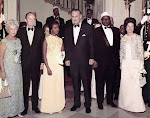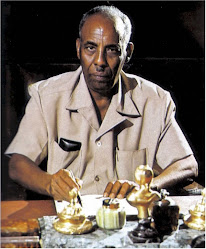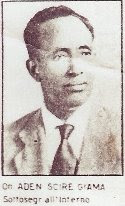Somalia's Prime Minister Mohamed Abdullahi Mohamed sits during consultations on the situation in Somalia in the Security Council Chambers at the United Nations headquarters in New York, March 10
Ambassador Dunn At UN Security Council Debate On Somalia
The situation in Somalia, as we have heard this morning, remains alarming. The Somali population face a dire humanitarian situation. We are gravely concerned about the approximately 2.4 million Somalis in urgent need of humanitarian assistance -- most of them living in areas held by al-Shabaab, areas where humanitarian space is shrinking. More than a year ago, the World Food Program was forced to suspend its programs in Shabaab-held territory due to threats and demands against WFP staff, and al-Shabaab has expelled several NGOs and other United Nations agencies. The inability to deliver humanitarian assistance under deteriorating conditions has meant that significantly more Somalis are seeking refuge and aid in neighboring countries. My government commends the efforts of UNHCR, WFP, UNICEF, the ICRC, and others as they continue to provide services under difficult conditions to the internally displaced and to Somali refugees in Kenya, Djibouti, Yemen, and Ethiopia, whose governments we thank for their hospitality.
Mr. President, we are deeply concerned by the continued threats to peace and security posed by radical extremists, criminals, and other spoilers in Somalia. Instability and lack of economic opportunity continue to fuel piracy off the coast of Somalia, which threatens not only the Somali people and seafarers but the stability of the region as a whole.Piracy off the coast of Somalia is seriously hindering the delivery of vital humanitarian aid to the region, international trade through the Indian Ocean, and the welfare of seafarers passing through the waters off the coast. Last month, as has been noted, four Americans tragically lost their lives while being held hostage by Somali pirates. The level of violence being used by pirates is escalating and their range of operations is broadening. These are troubling trends, and the international community, including this Council, must do more to address this flatly unacceptable situation by not only stepping up prevention efforts and enhancing judicial accountability but also going after those who finance, plan, and organize piracy activities. In this regard, the United States recently hosted an ad hoc meeting of interested members of the Contact Group on Piracy off the Coast of Somalia to explore more what the international community can do to go after those who unlawfully profit from these despicable activities. We strongly urge the international community to support these efforts.The United States commends the efforts of the 20 countries, including many members of this Council, that have built a multinational naval patrol to conduct counter-piracy operations and safeguard vessels. Additionally, while we consider options to ensure that pirates face judicial consequences, we hope that the international community will continue to support and enhance prosecution-related programs already underway. We welcome the contributions made by the UN and the Contact Group. We hope that the international community, including the Security Council, will work to ensure that the various initiatives that are being proposed complement each other. As we move forward, incarceration capacity should be a key focus of both this Council and the Contact Group on Piracy off the Coast of Somalia as the Secretary General's Special Advisor Jack Lang made clear in his comprehensive report to the Council; this will still be an issue no matter which prosecution mechanism we pursue.The obstacles to a stable Somalia, Mr. President, cannot be underestimated. Under the dual-track approach, the United States continues to support the Djibouti Peace Process and the TFG, even as we support other local and regional entities in Somalia that seek peace, reject terrorism, and are willing to work with the TFG. We are increasingly concerned about the incessant political infighting and the lack of progress on governance reform, basic services for the Somali people, and a functional political coalition that can govern and stabilize Somalia at large.We expect the TFG to take advantage of advances by AMISOM to make progress toward achieving its transitional tasks and expanding outreach throughout Somalia, a critical objective in our view. We also call on the TFG to immediately take steps to improve its financial institutions and procedures. We are looking for greater accounting of assistance funds provided by the international community and from revenue sources such as the Port of Mogadishu. In this regard, the United States has provided financial advisors to the Ministry of Finance to assist with revenue accountability. We call for the TFG to substantively improve its governance and security efforts--and to provide a sustained demonstration of commitment toward that end.
Finally, the United States does not support the unilateral three-year extension of the Transitional Federal Parliament. Similarly, we oppose any assertion that the current TFG should simply be extended past August 2011 absent a clear Somali roadmap for how the TFG would make the transition into a representative government within a defined timeframe. For credible progress to be made, we believe that TFG and Parliament must enter into serious discussions with regional partners, Special Representative Mahiga, and key supporters in the international community to identify a sensible, realistic way forward. I would especially like to note our appreciation for Special Representative Mahiga's continued work and leadership in this regard. The outcome of this process must advance the goal of building a comprehensive political solution and strategy for reconciliation and lasting peace.
Thank you, Mr. President.
(Distributed by the Bureau of International Information Programs, U.S. Department of State. Web site: http://www.america.gov)
Somalia PM - Security Council Meeting
Somalia PM Address UN Security Council - Today Security Council Meeting
Somali Islamists could grab tankers for attacks: PM
UNITED NATIONS (Reuters) – Somali pirates and Islamists are learning from each other and al Qaeda could hijack oil tankers to be used in September 11-style attacks, Somalia's prime minister said Thursday.
United Nations member states are being urged by Secretary-General Ban Ki-moon to increase their support to the 8,000-strong African Union peacekeeping mission in Somalia known as AMISOM.
Burundian AMISOM battalion
Mr. Ban told the Security Council that the transitional government of Somalia and AMISOM have expanded the areas they control in the capital Mogadishu after driving out the Al Shabaab insurgents.Mr. Ban added that the government and an allied militia have taken control of major towns in southern Somalia previously held by insurgents.He said AMISOM would even be more effective it had more resources, including helicopters and support for intelligence, surveillance and reconnaissance."The international community must keep its end of the bargain. There are critical gaps in the UN support package to AMISOM, and significant shortfalls of military assets and equipment. I appeal to Member States to increase their contributions to the Trust Fund for AMISOM and to reimburse contingent-owned equipment and troop-contributing countries."
10 March 2011 – The Security Council today called on the world community to provide urgently needed equipment to African peacekeepers in Somalia to consolidate recent fragile gains in stabilizing a country torn asunder by factional fighting for the past 20 years.
“The Security Council stresses the importance of predictable, reliable and timely resources for AMISOM,” the 15-member body said in a presidential statement, using the acronym of the African Union peacekeeping mission, during a day-long debate on the Horn of Africa country. It also stressed the need to reinforce the forces of the Transitional Federal Government (TFG).“The Security Council calls on the international community to make contributions urgently and without caveats to the UN Trust Fund for AMISOM or directly in support of AMISOM,” it added, underlying shortfalls in a force whose increase to 12,000 troops from 8,000 it authorized in December.It was a message Secretary-General Ban Ki-moon highlighted in a speech at the beginning of the debate, at which some 40 Member States are speaking.“AMISOM and the TFG need more than authorized troop levels – they need actual troops, equipment and enhanced capacity,” he said, stressing that the African force would be even more effective if it had more resources, including helicopters and support for intelligence, surveillance and reconnaissance.“The military gains by the Transitional Federal Government and AMISOM are fragile. The humanitarian situation is dire. Violence continues to rage,” he added of a country that has not had a functioning central government since 1991, and where Al Shabaab Islamist and other rebel groups now control much of the land, especially the south, and areas of Mogadishu, the capital.The TFG and AMISOM have succeeded in expanding their lines in Mogadishu, and with its ally Ahlu Sunna wal Jamaa the TFG has taken control of major southern towns held by insurgents. “We must help them to sustain these gains in order to restore security and deliver basic services, humanitarian aid and support for recovery and reconstruction,” Mr. Ban said.“The international community must keep its end of the bargain. There are critical gaps in the UN support package to AMISOM, and significant shortfalls of military assets and equipment. I appeal to Member States to increase their contributions to the Trust Fund for AMISOM and to reimburse contingent-owned equipment and troop-contributing countries.” Somalia’s transitional period was originally scheduled to end in August but the transitional parliament recently extended its mandate, without carrying out necessary reforms, by three years beyond that deadline, by which time it was to enact a new constitution and hold general elections. The Council today urged it to refrain from any further unilateral actions. It called on the TFG to engage in reaching agreement on post-transitional arrangements “in a more constructive, open and transparent manner that promotes broader political dialogue and participation.”
It also voiced serious concern at the worsening humanitarian situation, compounded by the current drought, which has left some 2.4 million Somalis in urgent need of aid and noted a continuing decline in humanitarian funding for Somalia.Mr. Ban cited reports that the drought had displaced some 50,000 people during the past two months, while in the central Hiraan region 70 per cent of the population is in crisis and food has not been distributed there since the UN World Food Programme (WFP) was forced to suspend its operations there in January 2010 because of fighting.“This year’s humanitarian appeal for Somalia seeks $529 million for urgent needs. As of last month, only one quarter of that amount had been funded,” he warned. On piracy, which has plagued the waters off Somalia’s shores, at times interfering with UN efforts to feed the country’s desperately poor, the Council condemned “in the strongest terms such violence, including hostage taking, murder and other acts of violence against individuals.” It called for a comprehensive response to tackle piracy and its underlying causes.In calling for today’s debate China, which holds the Council’s monthly presidency for March, noted that pirate attacks soared from 35 in 2005 to 219 last year, and that more than 20 ships with some 700 sailors are still in captivity. Mr. Ban also noted the underlying causes, calling for an integrated response to piracy based on three pillars: deterrence, development, and security. He has frequently stated that development, by providing alternative job opportunities on shore, forms a central plank in combating the scourge.“Somalia urgently needs our help. It faces levels of violence, damaging weather conditions and insecurity that would shake even strong countries,” he concluded. “AMISOM and the TFG have made some progress. But they need more support.“If we reinforce the military gains, provide humanitarian relief and achieve political progress, we can set Somalia on course for greater stability and peace. If we fail, we risk a growing humanitarian crisis, a deteriorating security situation, and a worsening threat to regional peace and stability.”Ambassador Dunn At UN Security Council Debate On Somalia
Remarks by Ambassador David Dunn, U.S. Alternate Representative to the United Nations, at a Security Council Debate on Somalia, March 10, 2011
Thank you, Mr. President, for convening this very important open debate and for seeking to bring a comprehensive perspective to the situation in Somalia. Let me also thank the Secretary General for his informative briefing. I would also like to thank TFG Prime Minister Mohamed for his remarks and Special Representatives Mahiga and Diarra for their participation today.Mr. President, on behalf of the United States, let me express my deepest condolences for those killed and wounded in the recent fighting in Somalia against al-Shabaab and its allies. In the current offensive, peacekeepers from the African Union Mission in Somalia and Somali National Security Forces have shown professionalism, dedication, and courage. We owe them our gratitude. I commend the resolve and commitment of the troop-contributing governments of Burundi and Uganda. The international community needs to do more to support AMISOM's troop, equipment, and resource needs.
The situation in Somalia, as we have heard this morning, remains alarming. The Somali population face a dire humanitarian situation. We are gravely concerned about the approximately 2.4 million Somalis in urgent need of humanitarian assistance -- most of them living in areas held by al-Shabaab, areas where humanitarian space is shrinking. More than a year ago, the World Food Program was forced to suspend its programs in Shabaab-held territory due to threats and demands against WFP staff, and al-Shabaab has expelled several NGOs and other United Nations agencies. The inability to deliver humanitarian assistance under deteriorating conditions has meant that significantly more Somalis are seeking refuge and aid in neighboring countries. My government commends the efforts of UNHCR, WFP, UNICEF, the ICRC, and others as they continue to provide services under difficult conditions to the internally displaced and to Somali refugees in Kenya, Djibouti, Yemen, and Ethiopia, whose governments we thank for their hospitality.
Mr. President, we are deeply concerned by the continued threats to peace and security posed by radical extremists, criminals, and other spoilers in Somalia. Instability and lack of economic opportunity continue to fuel piracy off the coast of Somalia, which threatens not only the Somali people and seafarers but the stability of the region as a whole.Piracy off the coast of Somalia is seriously hindering the delivery of vital humanitarian aid to the region, international trade through the Indian Ocean, and the welfare of seafarers passing through the waters off the coast. Last month, as has been noted, four Americans tragically lost their lives while being held hostage by Somali pirates. The level of violence being used by pirates is escalating and their range of operations is broadening. These are troubling trends, and the international community, including this Council, must do more to address this flatly unacceptable situation by not only stepping up prevention efforts and enhancing judicial accountability but also going after those who finance, plan, and organize piracy activities. In this regard, the United States recently hosted an ad hoc meeting of interested members of the Contact Group on Piracy off the Coast of Somalia to explore more what the international community can do to go after those who unlawfully profit from these despicable activities. We strongly urge the international community to support these efforts.The United States commends the efforts of the 20 countries, including many members of this Council, that have built a multinational naval patrol to conduct counter-piracy operations and safeguard vessels. Additionally, while we consider options to ensure that pirates face judicial consequences, we hope that the international community will continue to support and enhance prosecution-related programs already underway. We welcome the contributions made by the UN and the Contact Group. We hope that the international community, including the Security Council, will work to ensure that the various initiatives that are being proposed complement each other. As we move forward, incarceration capacity should be a key focus of both this Council and the Contact Group on Piracy off the Coast of Somalia as the Secretary General's Special Advisor Jack Lang made clear in his comprehensive report to the Council; this will still be an issue no matter which prosecution mechanism we pursue.The obstacles to a stable Somalia, Mr. President, cannot be underestimated. Under the dual-track approach, the United States continues to support the Djibouti Peace Process and the TFG, even as we support other local and regional entities in Somalia that seek peace, reject terrorism, and are willing to work with the TFG. We are increasingly concerned about the incessant political infighting and the lack of progress on governance reform, basic services for the Somali people, and a functional political coalition that can govern and stabilize Somalia at large.We expect the TFG to take advantage of advances by AMISOM to make progress toward achieving its transitional tasks and expanding outreach throughout Somalia, a critical objective in our view. We also call on the TFG to immediately take steps to improve its financial institutions and procedures. We are looking for greater accounting of assistance funds provided by the international community and from revenue sources such as the Port of Mogadishu. In this regard, the United States has provided financial advisors to the Ministry of Finance to assist with revenue accountability. We call for the TFG to substantively improve its governance and security efforts--and to provide a sustained demonstration of commitment toward that end.
Finally, the United States does not support the unilateral three-year extension of the Transitional Federal Parliament. Similarly, we oppose any assertion that the current TFG should simply be extended past August 2011 absent a clear Somali roadmap for how the TFG would make the transition into a representative government within a defined timeframe. For credible progress to be made, we believe that TFG and Parliament must enter into serious discussions with regional partners, Special Representative Mahiga, and key supporters in the international community to identify a sensible, realistic way forward. I would especially like to note our appreciation for Special Representative Mahiga's continued work and leadership in this regard. The outcome of this process must advance the goal of building a comprehensive political solution and strategy for reconciliation and lasting peace.
Thank you, Mr. President.
(Distributed by the Bureau of International Information Programs, U.S. Department of State. Web site: http://www.america.gov)
Somalia PM - Security Council Meeting
Somalia PM Address UN Security Council - Today Security Council Meeting
Somali Islamists could grab tankers for attacks: PM
UNITED NATIONS (Reuters) – Somali pirates and Islamists are learning from each other and al Qaeda could hijack oil tankers to be used in September 11-style attacks, Somalia's prime minister said Thursday.
Mohamed Abdullahi Mohamed told a U.N. Security Council debate on Somalia his embattled nation faced "two evils, the scourge of piracy and the plague of terrorism" with common roots in lawlessness, poverty and religious fanaticism."Not only are these two ills working in tandem, but they are learning from each other," Mohamed said."It will not surprise us if al Qaeda's agents in Somalia start hijacking tankers in the high seas and use them as deadly weapons," along the lines of the September 2001 attacks on New York and Washington using hijacked airliners, he said."Why bother with a small plane when you can capture a tanker?"Somalia's transitional government, backed by African Union peacekeeping forces, is fighting al Shabaab Islamists who claim ties to al Qaeda and control chunks of southern and central Somalia and parts of the capital Mogadishu.At the same time, pirates operating from the Somali coast have for years been seizing passing ships for ransom. Despite the efforts of international anti-piracy naval patrols, they are currently believed to be holding about 35 vessels.Mohamed did not elaborate on what targets huge and slow-moving tankers might be used against.The Security Council debate came as Somalia's AU-backed government forces have launched an offensive against al Shabaab. The government says it now holds 70 percent of Mogadishu and that the rebels are on the verge of collapse.
"DOZENS" LOST
But U.N. Secretary-General Ban Ki-moon told the council on Thursday that the 8,000-strong AU force, known as AMISOM and composed of troops from Burundi and Uganda, had lost "dozens" of men in the fighting.The military gains were "fragile" and the government's opportunity to consolidate its authority on areas under its control "may not last," he said.There were "critical gaps" in U.N. support for AMISOM, which needed more resources such as helicopters and intelligence backup. "The international community must keep its end of the bargain," Ban said, calling on U.N. member states to step up contributions to a trust fund for the AU force.An official statement by the 15-nation Security Council echoed that call and urged "all stakeholders" to develop a comprehensive strategy to establish peace and stability in Somalia, which has been in anarchy for 20 years.It also urged Somali authorities to speed up preparations for long-term governance of the country by an August deadline imposed by a 2009 peace deal. It said this should be done in "a more constructive, open and transparent manner that promotes broader political dialogue and participation."Britain's Africa minister, Henry Bellingham, who said London would donate $3 million to the AMISOM trust fund, criticized attempts to extend transitional institutions beyond August."It is troubling to me to hear about yet another reshuffle of the (government), as this suggests that political infighting is a higher priority ... than reconciliation and delivery of services to the Somali people," he said.
On piracy, Russian Ambassador Vitaly Churkin said his country would soon introduce a Security Council resolution to promote the struggle against it. That follows a recent U.N. report on ways of prosecuting captured Somali pirates, many of whom are now freed because no country will put them on trial.
Ban appeals for support for African peacekeepers in Somalia
United Nations member states are being urged by Secretary-General Ban Ki-moon to increase their support to the 8,000-strong African Union peacekeeping mission in Somalia known as AMISOM.
Burundian AMISOM battalion
Mr. Ban told the Security Council that the transitional government of Somalia and AMISOM have expanded the areas they control in the capital Mogadishu after driving out the Al Shabaab insurgents.Mr. Ban added that the government and an allied militia have taken control of major towns in southern Somalia previously held by insurgents.He said AMISOM would even be more effective it had more resources, including helicopters and support for intelligence, surveillance and reconnaissance."The international community must keep its end of the bargain. There are critical gaps in the UN support package to AMISOM, and significant shortfalls of military assets and equipment. I appeal to Member States to increase their contributions to the Trust Fund for AMISOM and to reimburse contingent-owned equipment and troop-contributing countries."









.jpg)











No comments:
Post a Comment